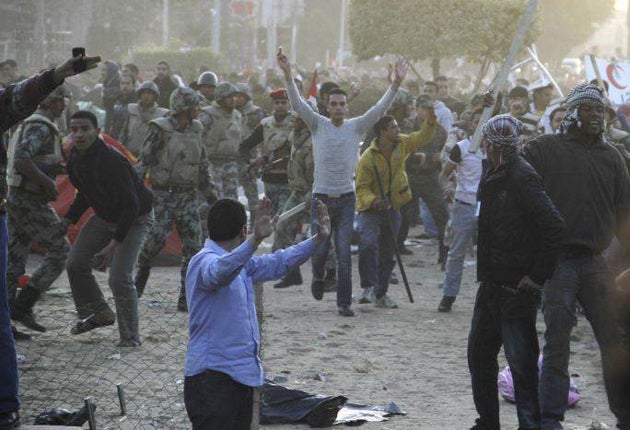Thirteen killed as violence returns to Tahrir Square

The euphoria that swept Egypt after the fall of Hosni Mubarak was souring yesterday after sectarian violence between Muslims and Christians left 13 people dead and armed men attacked demonstrators demanding reform in Cairo's Tahrir Square.
In a show of force against the demonstrators, a squadron of about 40 soldiers followed by chanting civilian supporters swept through the square last night and ripped down the tent village which has developed since Mubarak was toppled almost a month ago.
Witnesses said that at up to 100 civilians carrying knives and Molotov cocktails first attacked the tent village in the centre of the square in the early afternoon. The independent Egyptian newspaper Al Masry Al Youm quoted doctors in the camp's field hospital as saying 12 people were injured.
Troops moved in a few hours later, removing protesters with sticks while the pro-military supporters tore down tents and gleefully dragged canvasses out into the road. As scores of frightened demonstrators ran into the surrounding streets, a lone teenage boy set a gas canister alight and waved it at the advancing soldiers to try and frighten them off.
One soldier used a wooden stick to smash apart a loudspeaker hanging from a lamp-post; others frog-marched protesters through jeering crowds towards the Egyptian Museum, which is being used by the military to house detained protesters. At least 20 people were rounded up. One man was crying out as soldiers escorting him towards the museum building lashed him on the back of the head with a small whip.
"This is horrible," said Osama El-Abd, a 36-year-old film-maker, as he stood watching the soldiers ransacking the tent village. "The army should be with us, but this is very dangerous."
The army seized control of Egypt after an 18-day uprising, which saw tens of thousands of people gather in Tahrir Square to call for an end to Mr Mubarak's autocratic rule. Jubilation followed, but that is now ebbing away as a crime wave hits the streets after the police – widely reviled as enforcers of Mubarak's rule – shrunk from view and the military struggle to maintain security.
On Tuesday, a Million Woman March aimed at publicising women's rights in Egypt was marred by a counter-demonstration denouncing the female activists, with men heckling the women and telling them to go home.
The same day thousands of Muslims and Christians clashed in a Cairo suburb during a sit-in on a motorway organised by Christians. They were protesting about a suspected arson attack on a village church south of Cairo on Saturday, when another two people were killed.
The health ministry announced yesterday that 13 people had died in the violence, which cast a shadow over the pro-democracy movement, which had proclaimed unity between Muslims and Christians, who account for around 10 per cent of the population.
Youth groups and opposition figures, meanwhile, have kept up their campaign to rid the country of any trace of Mubarak. Ahmed Shafiq – appointed in the dying days of the Mubarak regime -- was forced to resign as Egypt's prime minister last week, with the military replacing him with Essam Sharaf. His cabinet met for the first time yesterday, and vowed to redeploy the police force, which has largely disintegrated.
Join our commenting forum
Join thought-provoking conversations, follow other Independent readers and see their replies
Comments
Bookmark popover
Removed from bookmarks